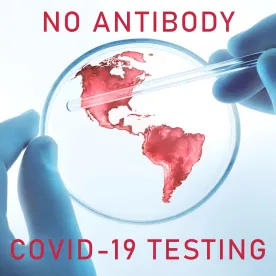On June 17, the Equal Employment Opportunity Commission (“EEOC” or “Commission”) issued new guidance to employers forbidding the administration of COVID-19 antibody tests under the Americans with Disabilities Act (“ADA”). EEOC COVID-19 Technical Assistance A.7. Though the ADA mainly protects disabled individuals from workplace and public discrimination, some parts of the Act apply universally. One such section prohibits employers from compelling workers to submit to medical examinations that are not “job-related and consistent with business necessity.” 29 CFR § 1630.14(c).
The Commission has already declared that employers may lawfully test employees for infection with COVID-19. However, the prohibited antibody tests (also called “serologic tests”) are distinct from tests that identify the active virus. Antibodies are generated as part of the immune response to a virus and remain in the body even after a full recovery from infection. Antibody tests, which require blood samples, are also more invasive than tests for the active virus, which require only respiratory samples such as a nasal swab.
Because antibodies are not detectable until several weeks after symptoms set in, the Centers for Disease Control and Prevention (“CDC”) has recommended that antibody tests “should not be used to make decisions about returning persons to the workplace.” CDC Antibody Testing Guidelines. The CDC has also said that while the presence of antibodies “likely indicates at least some degree of immunity,” it is not safe to assume that “individuals with truly positive antibody test results are protected from future infection.” CDC Antibody Testing Guidelines.
Citing the CDC’s recommendations, the Commission states that the antibody test does not meet the ADA’s “job-related and consistent with business necessity” standard for medical examinations or inquiries for current employees. Foremost, antibody tests provide little value to employers to determine whether employees pose an actual threat to the workplace. Second, COVID-19 antibody tests are more invasive to employee’s bodies and are not always reliable and consistent. In light of these facts, the EEOC has settled on a policy under which employers may test an employee for infection, but may not test employees to determine whether they have been infected in the past. This is the latest step on the fine line the Commission has walked during the pandemic between compelling business needs to maintain safe workplaces and protecting employee privacy rights under federal and state laws.
Takeaway
As businesses continue to refine COVID-19 policies and reopening plans, consider how employee rights to privacy are balanced against compelling business needs. Continue to monitor federal, state and local laws with respect to health screenings and obligations on employers if businesses test positive for COVID-19.
Co-author Garrett Stallins is an intern in the Labor and Employment Practice Group.




 />i
/>i

